«Curious about Northern Irish Cuisine? Read more...»
Boxty

Boxty (bacstaí or arán boct tí in Irish) is a traditional Irish potato pancake. The dish is mostly associated with the north midlands, north Connacht and southern Ulster, in particular the counties of Mayo, Sligo, Donegal (where it is know locally as Poundy or Poundies), Fermanagh, Leitrim and Cavan. There are many different recipes but all contain finely grated, raw potatoes and all are served fried. The most popular version of the dish consists of finely grated, raw potato and mashed potato with flour, baking soda, buttermilk and sometimes egg. [1] The grated potato may be strained to remove most of the starch and water but this is not necessary. The mixture is fried on a griddle pan for a few minutes on each side, similar to a normal pancake. Traditional alternatives include using only raw potatoes, boiling it as a dumpling or baking it as a loaf. The most noticeable difference between boxty and other fried potato dishes is its smooth, fine grained consistency.
Boxty was seen as so much a part of the local culture in the areas in which it was made, that the following poem was written-
| “ | Boxty on the griddle, Boxty in the pan, If you can't make boxty, You'll never get a man. | ” |
As the interest in Irish cuisine has increased, so the popularity of boxty has risen. It is not unusual to see boxty on the menus of restaurants outside the areas with which it is traditionally associated. Boxty may be bought in shops and supermarkets either in the dumpling form or ready cooked as pancakes. Some modern recipes use garlic and other spices to flavour the mixture. -Wikipedia
Brown Lemonade

Brown lemonade is a lemonade sold in Northern Ireland alongside the more recognisable "white lemonade"
There is very little difference in taste between the two except that brown colouring is used to alter its appearance.
Legend has it that in the Harland and Wolff shipyards in Belfast, employees were not allowed to drink alcohol on their lunch breaks. The shipbuilders were not keen on drinking soft drinks because they thought it to make them feminine and as a result brown lemonade was created as it could be drunk from a pint glass and look like a pint of ale.[citation needed]
The most common brands of Brown Lemonade in Northern Ireland are Cantrell & Cochrane (C&C) and Maine. - Wikipedia
Champ

Champ (brúitín in Irish) is an Irish dish, made by combining mashed potatoes and chopped spring onions ("scallions") with butter and milk, and optionally, salt and pepper. It is simple and inexpensive to produce. In some areas the dish is also called "poundies."
Champ is similar to another Irish dish, colcannon, which uses kale or cabbage in place of scallions.
The word champ has also been adopted into a popular Irish phrase, to be "as thick as champ", meaning to be stupid.
-WikipediaClub Orange
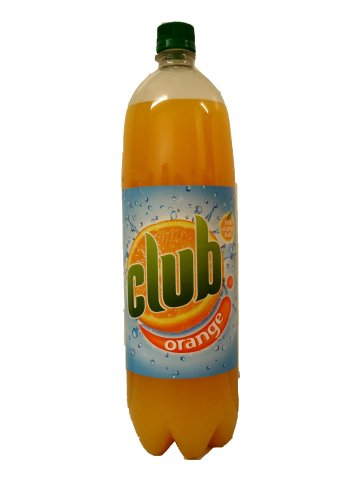
Club Orange is a popular Irish carbonated soft drink produced in Ireland by Britvic Ireland and previously by Cantrell & Cochrane (C&C) and bottled at their plant in Dublin.
The ingredients are carbonated water, sugar, orange juice, citric acid, the preservative (sodium benzoate), the colours beta carotene and apocarotenal, and vitamin C (ascorbic acid). It is distinctive for the orange vesicles, or "bits," that remain in the glass after being consumed.
Britvic Ireland also produce Club Lemon, Pomegranate & Cranberry, Rock Shandy (a mixture of the orange and lemon flavours), Club Apple, Club Berry, Club Strawberry and Club Cherry soft drinks.
The previous advertising slogan of Club was "the bits inside make it come alive" although it was rarely seen on Club bottles and commercials. From 2009, the products slogan is, Some bits are crucial, making reference to its orange vesicles. The slogan can be found on all Club products. It is so popular a drink with Irish people that it is one of the most sought-after products by Irish expatriates. -Wikipedia
Coleraine Cheddar
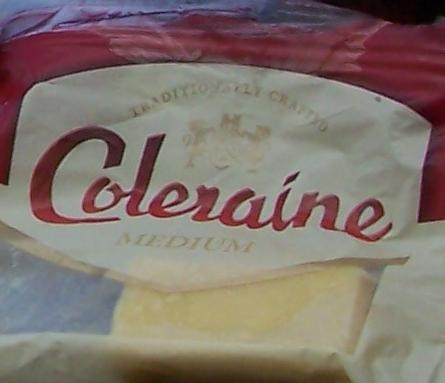
Coleraine Cheddar is a cheese made in Coleraine, Northern Ireland and was distributed by Castlewood Farm Products Ltd until it ceased trading recently.[citation needed] The product range continues to be distributed by Dairy Produce Packers Ltd of Coleraine. The company makes Coleraine Cheddar, Coleraine Mature White Cheddar, Coleraine Medium Cheddar, Coleraine Mild White Cheddar and Royal Canadian Mature Cheddar.
Coleraine Cheese is the leading cheese brand in Northern Ireland. -Wikipedia
Comber Whiskey

Comber Whiskey was an Irish whiskey distilled in Comber, County Down, Northern Ireland. The whiskey was last distilled in 1956. However, some reserves were discovered and bottled in the 1980s as "Old Comber" and some of these bottles occasionally come up for sale.
Comber Distilleries was established in 1825. At the time of its closure it was the last pot still in Northern Ireland. The Cooperage Coffee Shop on Killinchy Street in the town occupies the last remaining Comber Distilleries building. The shop contains some of the company's casks. -Wikipedia
Dulse

The red seaweed / macroalgae Dulse / Dillisk ( Palmaria palmata ) has been used for centuries in Ireland - particularly on the North and West coast of Ireland and in Northern Ireland.
This has been taken from a poem from the 12th Century
Seal ag buain duilisg do charraig,
seal ag aclaidh,
seal ag tabhairt bhídh do bhoctaibh,
seal i gcaracair.
A while gathering dulse / dillisk from the rock,
a while fishing,
a while giving food to the poor,
a while in a cell.
This red Irish seaweed is hand harvested from all around Ireland's shores. It is gathered at low water / tide and was traditionally air dried along the shore.
One of the main fairs / occasions of the summer in Northern Ireland is the Auld Lammas Fair in Ballycastle, Co Antrim. This traditional fair, held the last Monday and Tuesday in August dates back 1612 and is also a horse fair and attracts thousands of people to Ballycastle.
Dulse and yellowman - a hard sticky yellow toffee are the "traditions" of the Auld Lammas Fair.
There is an old song / poem and it goes
Did you treat your Mary Ann to some dulse and yellowman,
At the Auld Lammas Fair in Ballycastle?
Dulse can be eaten raw - it is traditionally eaten as a snack food in Northern Ireland and along the North and West Coasts of Ireland.
With the recent interest in macroalgae / seaweeds and their health benefits - seaweeds are more easily digested and contain more vitamins, nutrients and minerals weight for weight that land plants, many seaweeds have been introduced into recipes & food and Dulse / Dillisk be used in salads and throughout cooking.
Dulse has many uses including :-
* Food - as an additive, ground whole and consumed whole.
* Health and Cosmetics - as a mineral supplement - it contains ascorbic acid (vitamin C)
* Animal Feed
-From irishseaweeds.com
Farl

A farl (reduced form of the Scots fardel) is a term used in Northern Ireland and Scotland for some roughly triangular flat breads and cakes, traditionally made by cutting a round into four pieces.
In Northern Ireland it generally refers to soda bread and potato bread or cakes (potato farls). While soda bread can be made like normal breads, it is made into farls for use in the Ulster fry. A farl is a flat piece of bread about 3/4 inch thick with a rough quarter circle shape.
A farl is made by spreading the dough on a griddle or skillet in a rough circular shape. The circle is then cut into four equal pieces and cooked. Once one side is done the dough is flipped to cook the other side.
In Scotland today the word is used less than in Northern Ireland, but a farl can be a quarter piece of a large flat scone, bannock or oatcake. It may also be used for shortbread when baked in this particular shape.[1]
The word may be related to fallaid in some way. However, the Dictionary of the (Lowland) Scots Language says that farl is a shorter form of fardel, the word once used in some parts of Lowland Scotland for "a three-cornered cake, usually oatcake, generally the fourth part of a round". In Old Lowland Scots fardell meant a fourth or quarter.[1] -Wikipedia
Fried Bread
Fried bread, or fried slice, is bread which, after being sliced and fried, is served as part of a meal. Typically it is fried in the same pan as other ingredients in a meal, to absorb their flavour.
A British fry-up may include fried bread, as may the traditional full English breakfast. In the UK, the term "fried bread" may also refer to French Toast or "eggy bread", in which bread is coated in a mixture of whole egg and milk, and then fried, as an accompaniment to an English breakfast or as a snack.
Over the last couple of decades, concerns over health issues have led to the increasingly common substitution of toast for fried bread in these meals, although if the bread is fried on one side only with a minimal film of oil or fat in the pan it does not, in fact, contain any more fat than a slice of buttered toast.[citation needed]
A traditional Irish breakfast doesn't usually contain any fried bread[citation needed] but is usually accompanied by soda bread. In Northern Ireland this type of soda bread is more commonly referred to as Wheaten Farls. An Ulster fry contains fried soda farls, fried potato farls, and sometimes fried pancakes too. -Wikipedia
Maine Soft Drinks

Maine Soft Drinks Ltd. is a company based in Ballymoney, County Antrim, Northern Ireland, which sells soft drinks, cordials and aerated waters.
As well as having a presence in retail outlets, Maine is also known for its fleet of distinctive green lorries which deliver soft drinks door to door in Counties Antrim, Londonderry and Down. The person driving the lorries is often known colloquially as "The Lemonade Man" or The Maine Man or more commonly The Mineral Man.
Many of the products sold by Maine are specific to them in Northern Ireland such as American Kola, Scottish Cola, and Limeade; and some are specific to Northern Ireland but not to Maine such as Brown Lemonade. -Wikipedia
Nambarrie

Nambarrie is the brand name of a tea company based in Belfast, Northern Ireland, owned by Twinings. It was announced on 10 April 2008 that the Belfast factory is to close.
Founded in 1860,[1] the company began trading in York Street, originally as 'Pratt and Montgomery'. However, during wartime bombing in 1941, the company's premises in Tomb Street were completely destroyed, reportedly leaving only a horse drawn delivery van intact.
Nambarrie Tea Co. Ltd. now operates delivery depots in Mallusk, Co. Antrim and Glasgow, being the third biggest brand in Scotland.[1]
In 1998, Nambarrie teamed up with author Geoff Hill to sponsor "The Nambarrie Run: Delhi to Belfast on a Royal Enfield", and repeated the stunt in 2006 with "The Nambarrie Run II: Chile to Alaska on a Triumph". Richard McQuillan, Marketing Executive for Nambarrie said "We are delighted to be involved with Geoff in his latest journey, as the number one tea in Northern Ireland it is great that we can be supportive of our local writing talent." -Wikipedia
Old Bushmills Distillery

The Old Bushmills Distillery was founded in 1608 and is now owned by the major drinks company Diageo. Bushmills whiskey is produced, matured, and bottled on-site at the Bushmills Distillery in Bushmills, County Antrim, Northern Ireland. The distillery is a tourist attraction, with around 110,000 visitors per year. -Wikipedia
Pastie
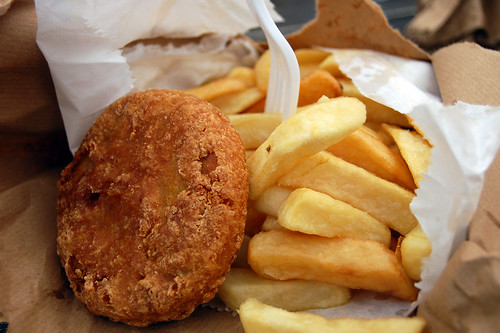
A pastie is a large, round battered pie common to Northern Ireland. It is a peculiarity of Northern Irish cuisine and is rarely if ever seen outside the area[citation needed]. Generally served with chips to form a pastie supper (supper in Northern Ireland meaning something with chips), or in a bread roll as a pastie bap, it is a common staple in most chip shops in the country.
Recipes vary, but the most common ingredients are minced pork, onion, potato and seasoning formed into a 'round' (just like a hamburger) which is then covered in a batter mix and deep fried. -Wikipedia
Potato Bread

Potato bread is a form of bread in which potato replaces a portion of the regular wheat flour. It is cooked in a variety of methods, including by baking it on a hot griddle or pan, or in an oven. It may be leavened or unleavened, and may have a variety of other ingredients baked into it. The ratio of potato to wheat flour varies significantly from recipe to recipe, with some recipes having a majority of potato, and others having a majority of wheat flour. Some recipes call for mashed potatoes, with others calling for dehydrated potato flakes. It is available as a commercial product in many countries, with similar variations in ingredients, cooking method, and other variables. -Wikipedia
Punjana

Punjana is a brand of tea produced by the Belfast based tea company Punjana Limited. Punjana Limited is the only major privately owned business in Northern Ireland involved in the importation, blending and packaging of branded and own label teas[1]. Punjana was founded in 1896 by the Thompson family. It has since become one of the most popular brands in Ireland and Scotland. It buys its teas from tea gardens in Assam, North India and on the slopes of Mount Kenya.-Wikipedia
Soda Bread
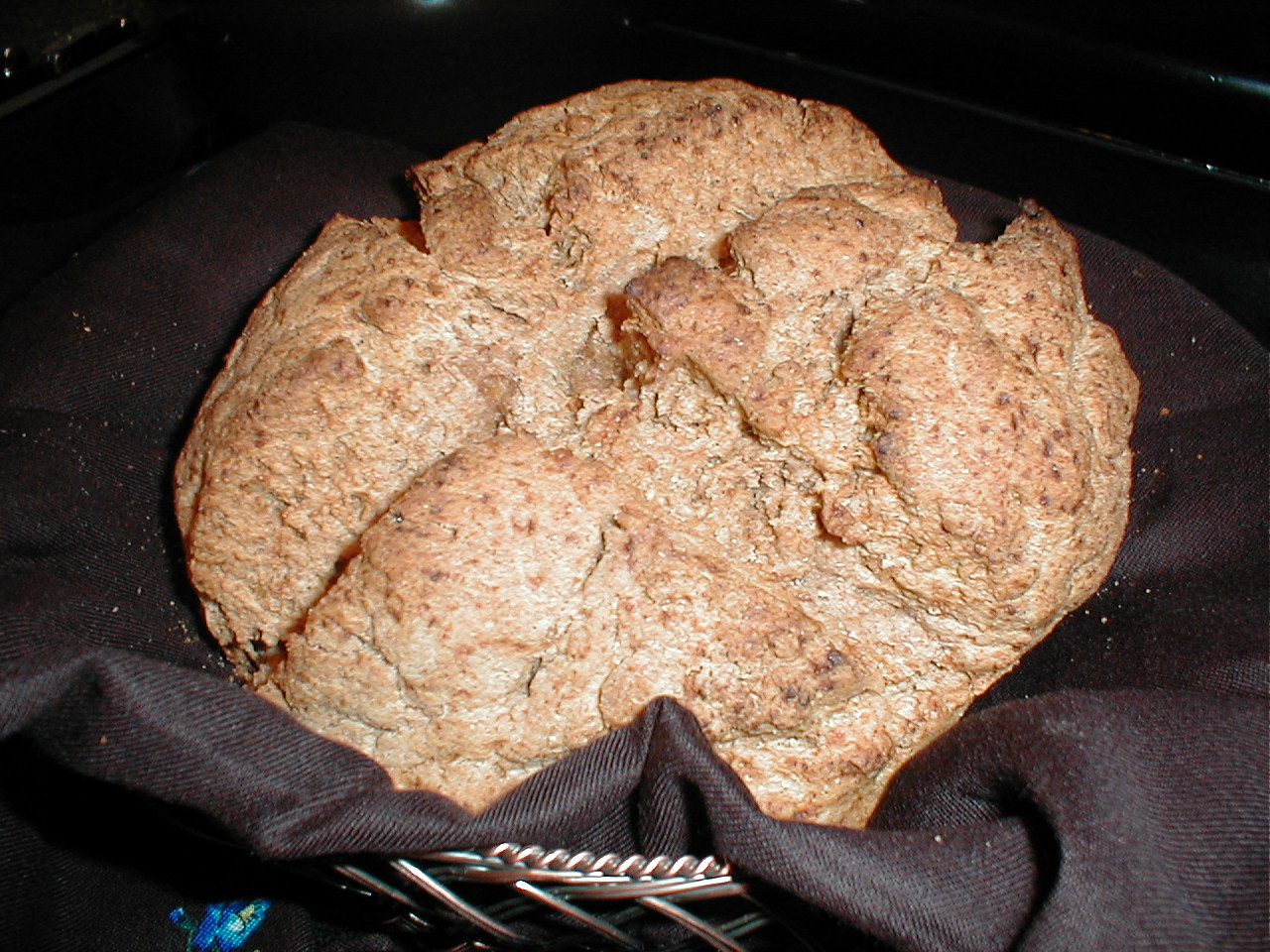
Soda bread is a type of quick bread in which bread soda (otherwise known as sodium bicarbonate or baking soda) is used for leavening rather than the more common yeast. The ingredients of traditional soda bread are flour, bread soda, salt, and buttermilk. Other ingredients can be added such as raisins, egg or various forms of nuts.
The buttermilk in the dough contains lactic acid, which reacts with the baking soda to form tiny bubbles of carbon dioxide. Soda bread can dry out quickly and is typically good for two to three days; it is best served warm or toasted. In Ireland, typically the flour is made from soft wheat; so soda bread is best made with a cake or pastry flour (made from soft wheat), which has lower levels of gluten than a bread flour.
Various forms of soda bread are popular throughout Ireland. Soda breads are made using either wholemeal or white flour. In Northern Ireland the wholemeal variety is known as "wheaten bread" and normally sweetened, while the term "soda bread" is restricted to the white savoury form normally served fried. The two major shapes are the loaf and the "griddle cake", or farl in Northern Ireland. The loaf form takes a more rounded shape and has a cross cut in the top to allow the bread to expand. The griddle cake or farl, is a more flattened type of bread. It is cooked on a griddle allowing it to take a more flat shape and split into four sections. -Wikipedia
Tanora

Tanora is a tangerine flavoured carbonated drink sold in Ireland (predominantly Munster - though traditionally it achieved high sales only in Cork). It was bought out by Coca Cola.
Tanora is packaged in 2-litre plastic bottles, 500ml plastic bottle and 330ml cans. It is also available in 200ml glass bottles reserved for the licensed trade.
Tayto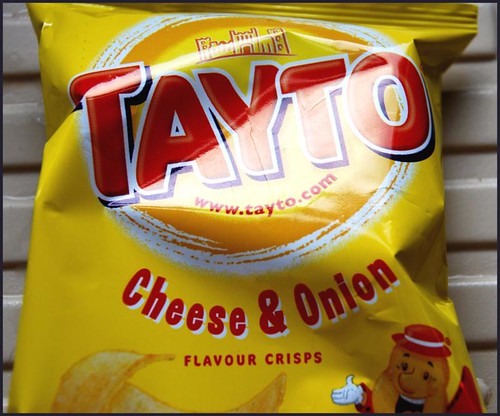
Tayto (Northern Ireland) Limited is a manufacturer of crisps and corn snacks based in Tandragee, County Armagh. They employ 300 people at their plant in Tandragee Castle and remain the largest selling brand of crisps in Northern Ireland. -Wikipedia
Ulster Fry

A popular combo-dish in Northern Ireland, the Ulster Fry consists of bacon, egg, sausage, soda bread, potato bread and fried tomato. It may also include black pudding or mushrooms. -Wikipedia
Veda

Veda bread is a malted bread sold in Ireland. It is a small, caramel-coloured loaf with a very soft consistency when fresh.
It is still impossible to find a recipe for a Veda loaf, over a hundred years after it was invented. However, devotees have had good results by following the instructions for a malted fruit loaf but without the fruit or alcohol.
Although a sweet bread, Veda is often eaten toasted with butter and cheese, although many prefer to add jam or marmalade. It is usually eaten as a snack.
Veda Bakeries hold all the original recipies for Veda bread. Veda Bakeries is a company registered by law. The company is based East Lothian, and is owned by Jim Kerr of forthestuary cereals.
The formula for Veda was allegedly stumbled upon by luck when a Dundee farmer’s house-keeper accidentally used damp wheat which had sprouted to produce malted wheat. When she used the malted wheat for the farmer’s bread it produced a sweet-malted flavoured bread – and Veda bread was born. -Wikipedia
Yellowman

Yellowman is a chewy toffee-textured honeycomb produced in Northern Ireland.
Yellowman is sold in non-standard blocks and chips and is associated with the Ould Lammas Fair in Ballycastle, County Antrim, where it is sold along with other confectionery and often dulse. It is similar to honeycomb, except that the more solid 'rind' usually consists of at least half the quantity. The rind is hard, having a similar consistency to rock.
Yellowman honeycomb is currently manufactured by the McCarthy Family Farms which runs the local bee farm in Newcastle. The bees' diet includes cider which is sprayed on flowers during pollenation which gives the honeycomb it's rich texture and flavour.-Wikipedia
I guess that's about it. If I'm missing anything please feel free to add to this list.









No comments:
Post a Comment